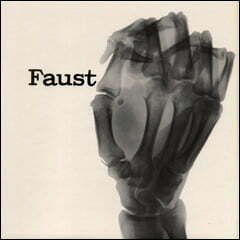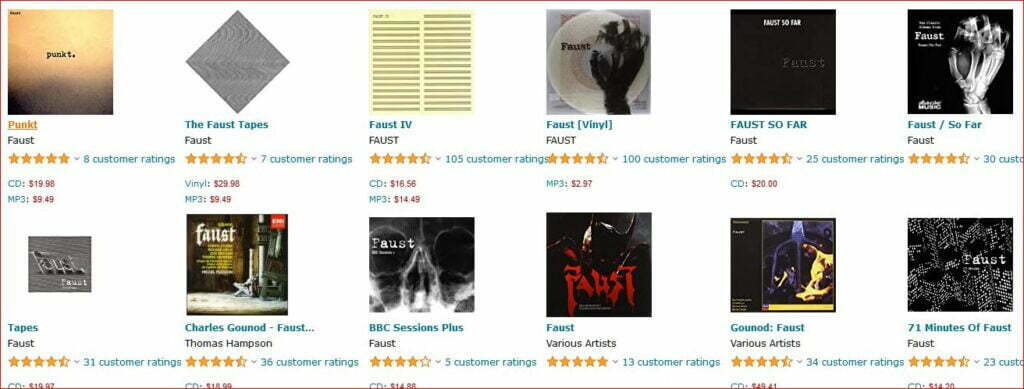Faust is an experimental rock band which came out of the Hamburg music scene in the late sixties. The somewhat offensive term “krautrock” has been applied to their music, and to the genre that ensued.
They first met in ’69: Arnulf Meifert, Gunther Wüsthoff, Rudolf Sosna, Hans-Joachim Irmler, Jean-Hervé Péron, and Werner ‘Zappi’ Diermaier. Three of the members, Jean-Hervé Peron, Rudolf Sosna and Gunther Wüsthoff had previously played in Nukleus, while Arnulf Meifert, Joachim Irmler and Werner ‘Zappi’ Diermaier were with Campylognatus Citelli. The original drummer, Arnulf Meifert left after the first album.
The band was loosely formed by 1971, but came together under the Polydor label (then under Deutsche Grammophon) after being introduced by leftist-journalist and Baader-Meinhof associate Uwe Nettelbeck who had been asked by Polydor to find a German band that could compete with the British and American bands that dominated the scene.
Despite being a virtually unknown band, Polydor acceded to their demands for time, space, freedom, and lots of money. After all, they were artists, and the Beatles and the Stones were making people stinking rich.
They spent a year recording their first album ‘Faust’ (a.k.a. ‘Clear’) in a rural studio in Wümme near Hamburg, produced by Nettelbeck, with engineer Kurt Graupner. Shadowy figures slipping in and out of the premises and presumed to be living in the basement were assumed to be Baader-Meinhof terrorists being sheltered by Nettelbeck, but no one wanted to ask.
The band pissed about for the first half year, and then set to work. As the year came to an end, they knew they’d only got one side of an album and patched together the rest from the first half-year’s work.
Released at the end of 1971, ‘Faust’ failed to deliver according to Polydor’s inflated expectations. Poor sales in Germany followed a technically disastrous concert at the Hamburg Musikhalle.
With their music always difficult to perform live, the equipment failed, and the audience was sent away to a bar while it was worked on. After a long delay the crippled concert began again with the remaining audience joining the musicians on-stage and jamming with the group long after the invited industry executives had left.
Fortunately album sales were better in Britain, bringing the group some off-shore fame and encouragement.
They made two more albums for Polydor–’Faust So Far’, in 1972, and a collaboration ‘Outside the Dream Syndicate’ with Tony Conrad in ’73 before they were dropped by Polydor for disappointing album sales.
Faust then joined up with the fledgling Virgin records, just started by Richard Branson.
The first album they put out for Virgin was a compilation of material recorded during the Wümme years. Sold for the price of a single, the album did well, but recording for Virgin didn’t, and ‘Faust IV’ was put out as the band seemed to disintegrate under the pressure of performing in a strange studio and because of studio interference from which they had been protected under the Polydor agreement.
After an intermission, the band met in Munich to put together a new album for Virgin, but Virgin declined to release it, or even to pay the extravagant bills run up by the band, although they did put out an ‘unofficial’ promotional cassette of material from the Munich sessions some time later, called ‘Faust V’ (or ‘Faust 5½’) in 1975.
Discouraged, the band faded away for a period until Recommended Records re-released a few of the earlier albums, and a compilation album from the Munich recording sessions, ‘Münich and Elsewhere’. From ’75 to the 90’s, apart from a few concerts, the band members went on with their lives, working and raising families.
In 1979, Recommended released two singles ‘Faust Party Extracts 1/6’, and ‘Faust Party Extracts 2/4′, compiled from material recorded during the early Wümme years, and an album ’71 Minutes Of…’ comprised of material from the early years and the Munich recordings for Virgin. After a number of years, Recommended released ‘Return of a Legend: Munic and Elsewhere’ in ’85 from the ’75 Munich tapes, and ‘The Last LP’ (a.k.a. ‘The Faust Party Album’) in 1989.
Despite seeming to disappear for a number of years, a trimmed-down Faust (Zappi, Irmler, and Péron) recorded ‘The Faust Concerts 1’ live at Prinzebar, Hamburg, 1990, and also released the single ‘Chemical Imbalance’ from that concert in the same year.
That began a resurgence of the band, and in 1992 the band recorded another live performance, the chaotic ‘The Faust Concerts 2’ at The Marquee in London, marking twenty years since their Virgin debut.
In ’94 Faust began their first tour of the US with seven dates, including performance/recording sessions in Death Valley.
In ’96 they released Faust: Untitled, the first release on Irmler’s own Klangbad label, and ‘The BBC Sessions’. Around that time Sosna, re-united with the band for the two releases, died of alcoholism.1
Following that, the band released ‘you know faUSt’ in ’97, as well as a single ‘Trafic,’ and separate releases of LP and CD companion albums for the silent film Nosferatu, called ‘Faust Wakes Nosferatu,’ each containing different material.
In ’97, Faust released ‘Live in Edinburgh’ recorded live at the Edinburgh Fluxus Festival. Again in ’97 they released ‘Hurricane,’ a video of concerts at The Garage in London filmed in 1996, and another video in ’98 entitled ‘Faust in Japan.’
‘Ravvivando’ followed in ’99, but without Jean-Hervé Péron who had had a brief falling-out with fellow original band members Imler and Diermaier in ’97, but re-joined in 2004.
In 2000 ‘Faust: The Wümme Years’ was released, It was a compilation of early work and the BBC sessions, along with some previously unreleased tracks. Also in 2000 they released ‘The Land of Ukko and Rauni’, recorded live in Helsinki; another concert album ‘Live at The Garage’ (recorded live at The Garage, London, 2nd Dec 1996) with Péron; and another compilation album, ‘So Far,’ combining the first two albums, ‘Faust’ and ‘So Far.’
‘Patchwork 1971-2002’, released in 2002 covers the full period of Faust, from 1971 to 2002, with both original and re-mixed tracks.
Again in 2002, ‘Freispiel’ consisted of remixes of ‘Ravvivando’ by different artists such as the Austrian band Sofa Surfers and Scottish musician/producer Howie B.
In 2003 Faust privately released the 4-CD ‘Abzu’ containing live, new and previously un-released material and interviews from different stages in the band’s career covering 1971-2002.
In 2005 Faust and Zappi Diermaier released the DVD-video ‘Impressions’ with three previously-unreleased tracks, as well as the limited edition CD/DVD set ‘Metz Box’, and the concert DVD-video ‘Authentic Life’ from a 2004 concert in Zagreb.
In 2007 the DVD ‘Trial and Error 2005’, an experimental studio video was released, as was ‘Nobody Knows if it Ever Happened’, also a video. A concert CD ‘Live in Krakow 2006’ recorded live at The Loch Ness Club, Krakow, and another concert CD/DVD ‘Faust in Autumn’ which was a compilation of material from the ‘Faust in Autumn/Perfidious Albion’ tour of the UK in 2005 were released. Also released was ‘Disconnected’, mixed and produced by Nurse With Wound.
Again with guests Steven Stapleton and Nurse With Wound, ‘Schiphorst 2008’ was recorded live at the Schiphorst Avant-Garde Festival and released in 2009.
Collaborations and Solo
‘Outside the Dream Syndicate’ with Tony Conrad was one of many collaborations with other bands and musicians, and band members have produced independent efforts outside of the Faust band. You can (might) find these listed at the (dated) website faust-pages.com
Recent Faust
Faust, never strong on identity, split into two Fausts: of the original members of Faust, two remain with one band: Werner Diermaier (drums), and Jean-Hervé Péron (bass and vocals), and one, Hans Joachim Irmler was with the other.
Diermaier/Péron Faust’s more recent releases are ‘C’est Complique’, a remix of 2007’s ‘Disconnected,’ and ‘Fresh Air’ in 2017. The Diermaier/Péron band toured America in 2016 and Europe in 2017 as FaUSt.
In 2010, Irmler released ‘Faust is Last’ on his Klangbad label. Irmler performed in recent years with the late Jaki Liebezeit (2017), and produces at Klangbad Studios.
Creator and producer of Faust, journalist, radial activist, and German film critic in the sixties, Uwe Nettelbeck died of cancer on the 17th of January 2007).
Faust: Stretch Out Time 1970-1975
Andy Wilson, the webmaster of the Faust web site, the Faust-Pages, has written a book about the band which was published in 2006. It’s available at Amazon.com. For more information, check out the band’s web site:
Faust: Stretch Out Time 1970-1975.
External links
- http://faust-news.blogspot.ca/ – most current (2017) known Faust information site.
- The ‘official’ Faust Pages (not updated).
- Klangbad–Hans Joachim (Jochen) Irmler’s Page.
- Jean-Hervé Péron’s Page.
- Faust at the All Music Guide.

Check out the Wikipedia article on “Faust (Band)“.
- http://faust-pages.com/publications/jeanherve.rudolfsosna.html [↩]



2 Replies to “Faust (band)”